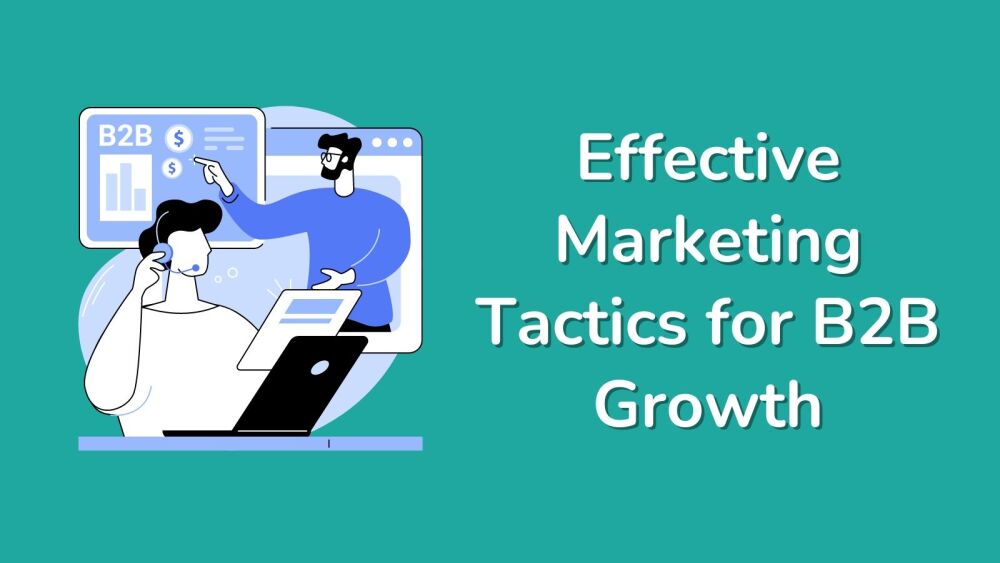Essential B2B Marketing Strategies for Sustainable Growth
Posted on
Understanding and adapting to the ever-evolving nature of business-to-business (B2B) marketing is paramount for companies aiming for growth. The digital revolution has dramatically altered traditional approaches, leading to more innovative and impactful tactics.
This guide offers six strategic marketing approaches essential for B2B expansion with insights into their implementation for lasting success.

1. Content Marketing: The Core of Your Digital Strategy
Content marketing lies at the core of modern B2B marketing, serving as the cornerstone of digital engagement. Content marketing aims not simply to drive customer action but to establish your company as an authority in its field - creating trust with potential clients along the way.
Effective content marketing involves multiple steps. First and foremost is developing an in-depth knowledge of your target audience through data analytics and customer feedback, leading to buyer personas - fictionalised representations of ideal customers - that help tailor content specifically to their needs and challenges.
Diversifying your content - ranging from blog posts, e-books, webinars, and podcasts - engages multiple audience segments, enriching the sales funnel journey for those entering it from multiple directions. Monitor its performance regularly to optimise and refine it continuously.
Social media should not be ignored as well. TikTok and Instagram should be two of the main platforms you should consider producing content for as they boast over a billion users each.
If you are wondering how to get real TikTok followers or boost your Instagram presence, the path is quite simple: produce daily content and partner with the right people. For instance, if you want to grow fast, you can hire an organic growth agency or partner with influencers to help you with content production and presentation.
An impressive 71% of B2B content marketers have acknowledged that content marketing is more critical than it was last year. This trend underlines the evolving landscape where content marketing is not just an option, but a necessity for engaging and educating B2B customers who prioritise expertise and value information over mere promotional content.
2. Utilise LinkedIn for Lead Generation
Thanks to its professional environment and advanced targeting capabilities, LinkedIn has quickly become an invaluable B2B marketing platform. Businesses using this platform can generate leads, establish their brand authority and connect directly with key players in their field.
To use LinkedIn effectively, it’s important to have an interesting business profile that clearly explains the value your company brings. Getting involved with related groups, leaving comments on posts and sharing knowledge from the industry are good methods for making your brand more visible and establishing yourself as a professional in the field.
You can find leads using LinkedIn Ads and Sales Navigator too. This makes it a good strategy for generating new leads because these tools have advanced features made especially to find and contact possible customers or partners.
3. Account-Based Marketing (ABM): An Individualised Approach
ABM represents a strategic shift in B2B marketing by targeting key accounts rather than broad audiences. This approach recognises the complexity associated with purchasing decisions made by businesses with multiple stakeholders by tailoring marketing efforts specifically to each targeted account's needs and interests.
Implementing ABM requires identifying accounts with high revenue potential, tailoring content specifically to them, and working collaboratively between marketing and sales teams to deliver exceptional customer experiences.
4. Email Marketing: Fostering and Nurturing Relationships
Though many predict its decline, email marketing remains an integral component of B2B communication strategies. Its effectiveness lies in its ability to cultivate leads and maintain customer engagement over time - offering cost-effective marketing channels for personalised communication.
Successful email campaigns feature list segmentation where emails are tailored based on recipients' industry, role, stage in the buying cycle, or needs/challenges they face.
Additionally, valuable content that addresses recipient challenges is provided as part of targeted follow-up emails with personalised touches, adding the human element crucial for building relationships.
5. Search Engine Optimisation (SEO): Enhancing Your Online Presence
As companies increasingly compete online, SEO is key to their visibility. SEO enhances online visibility by making your website prominent in search engine results pages (SERPs), making it more likely for potential B2B clients to find and visit it.
Successful SEO strategies involve conducting extensive keyword research to understand what potential clients are searching for, optimising on-page elements with these keywords, and prioritising user experience across devices - these components all work together towards making SEO work for businesses.
6. Strategic Partnerships: Extending Reach Through Collaboration
The formation of strategic alliances between businesses offering complementary products or services can open up new markets and present growth opportunities. From co-developing products to co-marketing initiatives, strategic alliances enable businesses to capitalise on each other's strengths to reach larger audiences.
When searching for potential partners, look for those offering complementary services as well as having similar target markets. Setting mutual goals while cooperating on marketing initiatives (such as joint webinars or co-authored content production) will increase reach and impact significantly.
Conclusion: The Pathway to Sustained B2B Growth
Above you can find many strategies that can help you effectively boost your B2B market performance. These include using platforms such as LinkedIn, taking an ABM-oriented approach, employing effective email marketing campaigns, optimising for SEO purposes, and forging strategic alliances.
These tactics provide businesses with a solid basis upon which to build. Each of these strategies requires careful planning, implementation, and ongoing optimisation; when combined they become a potent toolkit to improve market presence and drive long-term growth. As B2B continues its rapid evolution, staying informed and agile with your marketing efforts will be crucial to remain on top.
Check out these B2B companies that are making their mark!
